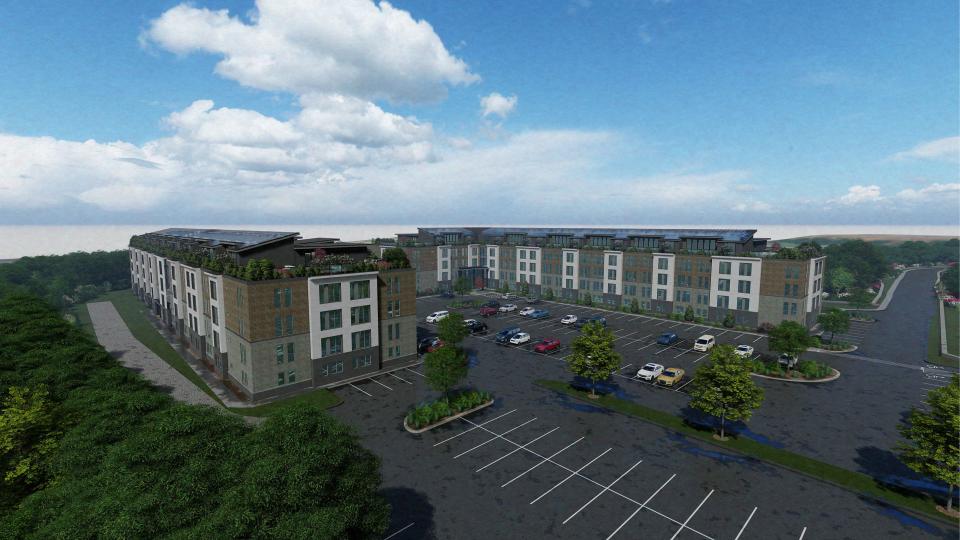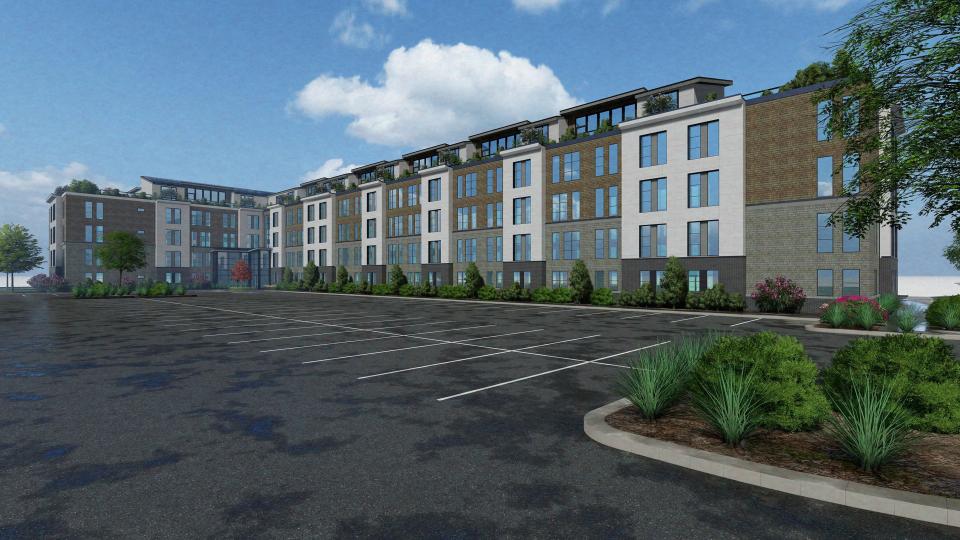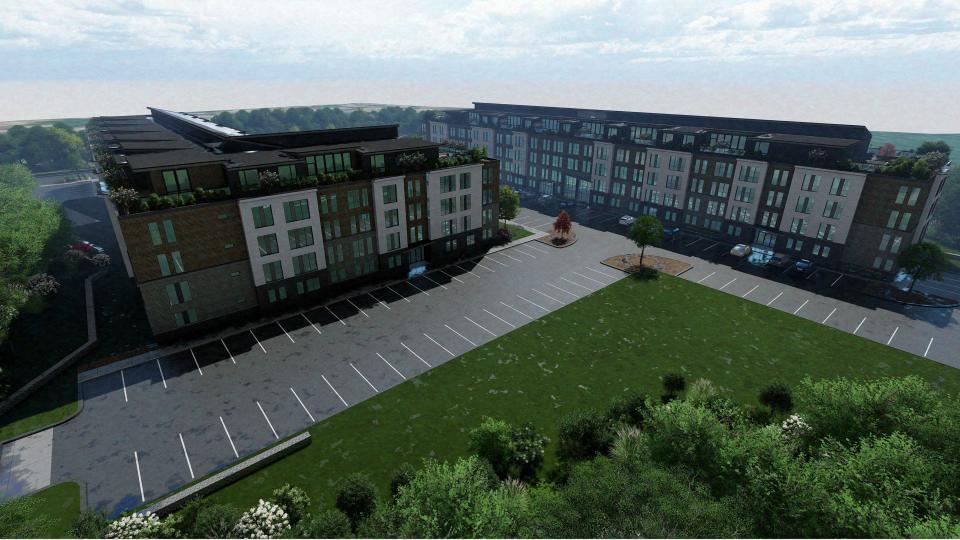'Horror show' or clean soil? Contamination questions linger for proposed Rockland complex
ROCKLAND – While local authorities say they're happy with many of the recent changes made to the controversial Shingle Mill development proposed in Rockland, environmental concerns now stand to impact the project's future.
In a recent meeting, Shingle Mill project developer Rick Lincoln presented plans that dropped the proposed number of units from 236 to 212, softened the roof line with plants and reduced the number of parking spaces. Zoning board members said they were generally happy with the softer designs and new rendering, but an environmental testing report by the company Tighe and Bond largely dominated the conversation.

"This report convinced me we have a real horror show on our hands if this project gets built," Rockland Zoning Board of Appeals Member Greg Tansey said.
Tighe and Bond recently submitted a report to the town that board members say was full of so many disclaimers and caveats, it may as well have not been written in the first place. While the company found no reason to suspect soil contamination, one of the largest concerns about the site, Tansey said the list of disclaimers meant the report shouldn't be trusted.
South Shore housing crisis series: Experts: Massachusetts housing crisis was years in the making
South Shore housing crisis series: Housing Choice has come to Massachusetts. What does it mean for the South Shore?
Board member Robert Baker Jr. said he had never seen a report with so many disclaimers.
"This makes me question every bit of information that has been submitted to us by the applicant," he said.
In addition to Tighe and Bond, a report on the project was done by ecological impact assessment and permitting company Coneco Engineers & Scientists, Inc, which Lincoln said is a more reliable document. Lincoln is the owner of Coneco Engineers & Scientists, according to records from Secretary of State Bill Galvin's office.
Neither the town's zoning board of appeals nor its conservation commission responded to multiple requests from The Patriot Ledger to see the reports.

Soil, ground water concerns
In addition to worries about soil contamination, the cleanliness of groundwater the project wants to pump also came up. Lincoln said tests of the groundwater showed no contamination and no signs of the "forever chemicals" PFAS, an issue Rockland and other South Shore towns are contending with.
Under a permit from the state, the project drilled three wells and has yet to conduct a "pump test," where they vigorously pump water out of the ground to see if it causes water levels in the surrounding wetlands and the Rockland Abington reservoir to dip.
Tansey called Lincoln's water testing "totally inconclusive," saying that the site of the proposed apartment complex is likely contaminated. Tansey did not say if he read the testing report.

A previous agreement with the town's joint water department had Lincoln paying $1 million to hook up to the town's water supply, but the project will now pump its own water.
Last November, the state gave Rockland and Abington a $2.24 million grant to begin operating an unused well to increase water capacity, pumping an additional 80,000 gallons a day for Rockland.
The fact that the project is downstream from one of the town's water supplies could be a bigger issue.
At least three streams run through the property and into the reservoir, giving the area the highest level of state protection and severely limiting what can be done around and to them.
State Department of Environmental Protection representatives said in an email to town officials that at least two of the streams require the state's stringent "Zone A" restrictions. Storm water cannot be funneled into those streams, and wastewater and septic systems can't be nearby.
'We just miss him': UNH student Vinny Lirosi, of Whitman, remembered by his brother. No charges expected.
April 14, 2021: Streams leading to drinking water reservoir pose problem for Rockland development
That complicates the project because the town's sewer commission has been silent on whether it will allow the development to hook up to the municipal sewer system. If it can't, the developer has proposed putting in a new system, essentially a large septic tank.
A hookup to the town's sewer system would cost at least $1.7 million, a price the developer previously said he would be happy to pay.
Lincoln will have his company, Coneco, resubmit its report and data. The town will hire an environmental peer reviewer and go over Coneco's report and the data it collected. The next hearing is set for March 1.
Parking, recreation fly under the radar
At the recent meeting, Lincoln said he reduced the amount of parking to 329 spots, a ratio of 1.55 spaces per unit. Before Lincoln took over from Jones Street as the developer, enough parking spaces had been a point of contention with the zoning board. In 2020, Tansey said he wanted a ratio of 2.25 parking spaces per unit.
Member Stephen Galley said he was concerned about the reduced parking.
Looking to the sky: Stressful times for a respiratory specialist. Rockland man relaxes flying huge kites.
Board member Tim Haynes said the development seems great for adults but there needs to be more space for children to play and for parents to walk with strollers.
Chairman Rob Rosa said another unresolved issue carried over from hearings with the former developer, Jones Street, is the developer's financial necessity for the two apartment buildings to be five stories tall. He wants them to be four stories tall at most.
The building would be flanked on one side by the five-story tall Doubletree by Hilton.
See our past coverage of the Shingle Mill development
Nov. 14, 2021: 'Capacity is a huge concern': Rockland, Abington to spend $2 million tapping unused well
Oct. 21, 2021: Controversial Rockland affordable housing project expected to downsize after developer replaced
Aug. 19, 2021: Rockland zoning board sets final hearing date for controversial apartment proposal
Aug. 13, 2021: Rockland citizens group formed to oppose 236-unit apartment complex
April 14, 2021: Streams leading to drinking water reservoir pose problem for Rockland development
April 7, 2021: Rockland developer asks for more time to address conservation issues
March 18, 2021: Rockland delays decision to allow pump tests for 40B project north of reservoir
March 3, 2021: Deadline looms for proposed 236-unit apartment complex in Rockland
Feb. 3, 2021: Rockland 40B project still waiting on answers from sewer commission, zoning board
Jan. 22, 2021: Developer of 5-story apartment complex in Rockland seeks $1 million water hook-up
Dec. 16, 2020: Developer pushes for 5-story apartment complex on Pond Street in Rockland
Sept. 16, 2020: Parking and traffic still major concerns for Rockland 40B project
July 24, 2020: 236 unit apartment complex proposed for Rockland
Thanks to our subscribers, who help make this coverage possible. If you are not a subscriber, please consider supporting quality local journalism with a Patriot Ledger subscription. Here's our latest offer.
Reach reporter Wheeler Cowperthwaite at wcowperthwaite@patriotledger.com.
This article originally appeared on The Patriot Ledger: Questions over soil testing dominate Rockland apartment complex plans

